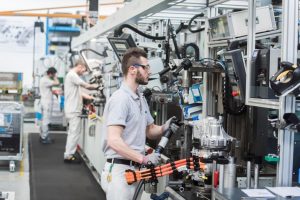Inflation rises in July

INFLATION grew by 0.1% in July, up from 0% in June, latest figures have shown.
Data compiled by the Office for National Statistics shows the increase in the Consumer Prices Index was fuelled by a smaller fall in clothing prices on the month compared with a year ago.
However, the ONS said falling prices for food and non-alcoholic beverages helped to partially offset the rise.
Business leaders in Greater Birmingham said the rise was positive news.
Paul Faulkner, chief executive of Greater Birmingham Chambers of Commerce, said: “This rise comes at a time of year when prices tend to fall because of summer sales so today’s low inflation figures, in combination with the steady rise in wages we are currently enjoying, paint a positive picture for the working people and family budgets of Birmingham.
“Nevertheless, we need to ensure that we do not rest on our laurels as there is still much to be done in order to protect our economic situation and inspire further confidence in the business community.”
The ONS said the CPI fell by 0.2% between June and July 2015 compared with a larger fall of 0.3% between the same two months a year earlier. The one-month movement was therefore 0.1 percentage points higher this year compared with a year ago, resulting in a rise in the CPI 12-month rate.
By far the largest upward contribution to the change in the CPI 12-month rate between June and July came from clothing and footwear. Prices overall, fell by 3.4% between June and July this year compared with a larger fall of 5.7% between the same two months a year ago. Prices normally fall at this time of year due to the summer sales and the fall between June and July this year was in line with recent years. However, the price fall between June and July last year was larger than usual and followed an atypical price increase between May and June 2014.
In the year to July 2015, food prices fell by 2.7% and the price of motor fuels fell by 11.4%. These two groups have provided some of the largest downward contributions to the 12-month rate during 2015. In July 2015, the food and motor fuels groups in total reduced the CPI 12-month rate by approximately 0.7 percentage points. Historically, price movements for these products have been among the main causes of inflation.
Prices for food and non-alcoholic beverages were said to have fallen by 0.7% between June and July this year, compared with a smaller fall of 0.2% between the same two months a year ago.
The downward contribution came from price movements in most sectors – notably in the milk, cheese and eggs sector.
Average petrol prices rose by 0.1p and diesel prices fell by 2.5p between June and July this year to stand at 116.5p and 118.7p per litre respectively. This compares with a rise of 1.0p per litre on petrol and no change on diesel between the same two months in 2014.
Sara Fowler, senior partner at accountancy firm EY in the Midlands, said: “July’s uptick in inflation represents something of a false signal. The increase is largely due to clothing prices, with this year’s summer sales seeing less discounting than last year’s, and an increasing pressure on air fares.
“Overall, the modest pickup in inflation appears to be largely a function of temporary factors rather than a sign that inflationary pressures are escalating.
“There is a good chance that we will see the CPI measure turn negative again in August. Base effects are set to depress the year-on-year comparison, while the renewed drop in oil prices is steadily feeding through to prices at the pumps.
“In addition, today’s producer prices data indicates that there are still no inflationary pressures coming along the supply chain, while the strong pound continues to weigh on import prices.”









